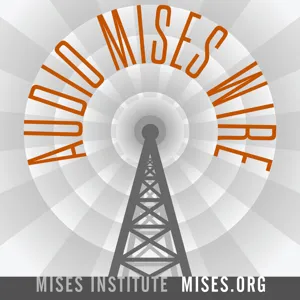Podcast Summary
Anarchy vs Order: Anarchy doesn't mean chaos or destruction, but a state of freedom where rules govern interactions between individuals and groups without a central authority or government.
Anarchy, as often perceived, is not synonymous with chaos, destruction, or violence. Rather, it refers to a state of affairs where rules govern interactions between individuals and groups, without the need for a central authority or government. The Economist's concern about the potential collapse of the global liberal order and the subsequent descent into anarchy is misguided, as anarchy can also mean a universe of emergent order. The misconception arises from the belief that order can only exist under the direction of rulers, but Adam Smith's contemporary, Adam Ferguson, famously described it as a state of rules, not rulers. Anarchy is not a disorderly or frightful condition, but a state of freedom where individuals cooperate and associate voluntarily.
Property Rights in Anarchy: In anarchy, property rights emerge through human agreement and enforcement to prevent conflicts over scarce resources, as seen in frontier settings and the evolution of Bitcoin's limited supply.
Property rights are essential rules that determine how resources are used, particularly in situations where resources are scarce and conflicting uses exist. These rules are not naturally occurring but are established through human agreement and enforcement. The concept of property rights became clear to the speaker when considering the frontier setting in the context of anarchy, where humans established boundaries and fenced land to prevent conflicts over its use. Resources, such as land, become scarce and valuable when multiple parties have conflicting uses for them. Economics professor Paul Seabright further emphasizes this point in his book "The Company of Strangers," discussing property rights over water. He adds that rules are worth making only if the cost of enforcing them is affordable. The speaker also references Bitcoin and its limited supply of 21 million as an example of a scarce good, contrasting it with abundant resources like air that have no economic value due to their surplus. The speaker's perspective challenges the common perception of anarchy as chaotic and disrespectful of property rights, emphasizing that in such settings, the rules themselves evolve.
Anarchy and self-governance: Anarchy can function effectively through self-governance and voluntary submission to agreed-upon rules, as demonstrated by Bitcoin, faith groups, and friendships.
Contrary to the beliefs of certain philosophers like Hobbes and Rousseau, humans do not inherently require a strong central authority to maintain order and protect property rights. Instead, private agencies and social institutions play a crucial role in fostering an orderly society. Anarchy, as seen in Bitcoin and many faith groups and friendships, can function effectively when individuals submit to good rules and restrictions that align with their nature. Freedom is not about the absence of all restrictions, but rather about understanding and adhering to the right ones. Bitcoin, with its clear rules and lack of management, is an example of this anarchic yet functional system. Faith groups and friendships, while less structured than Bitcoin, also demonstrate this principle of self-governance and voluntary submission to agreed-upon rules.
Anarchy vs Chaos: Anarchy doesn't mean chaos or lawlessness, it's the absence of a central authority where rules and order are established by the participants themselves.
Anarchy does not mean chaos or lawlessness, as commonly believed. Instead, it refers to the absence of a central authority or ruler, where rules and order are established and governed by the participants themselves. This misconception was highlighted in a recent article by The Economist. Anarchy in relationships, business transactions, or even global politics, does not equate to anything goes or might is right scenarios. Instead, it implies that the parties involved have the freedom to negotiate, expend, or reduce the terms of their interactions, without external interference. Friendships at the office, for instance, can be dissolved when they no longer serve their purpose. It's essential to understand that anarchy is not synonymous with destruction and conflict, but rather a system of self-governance.
